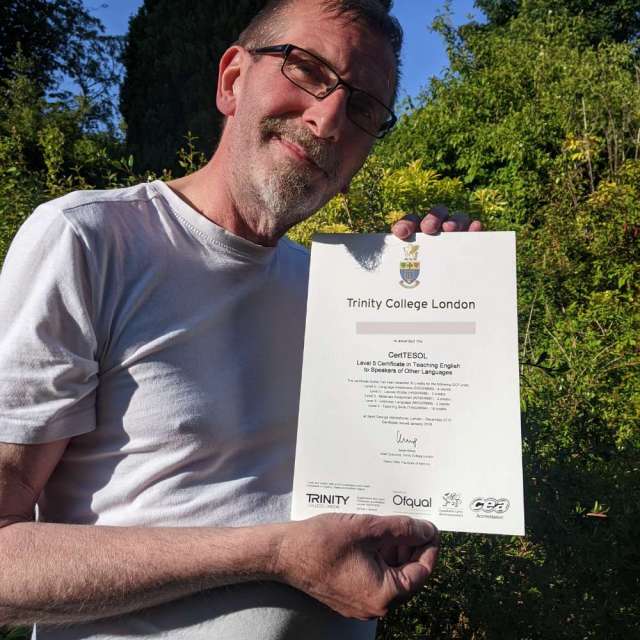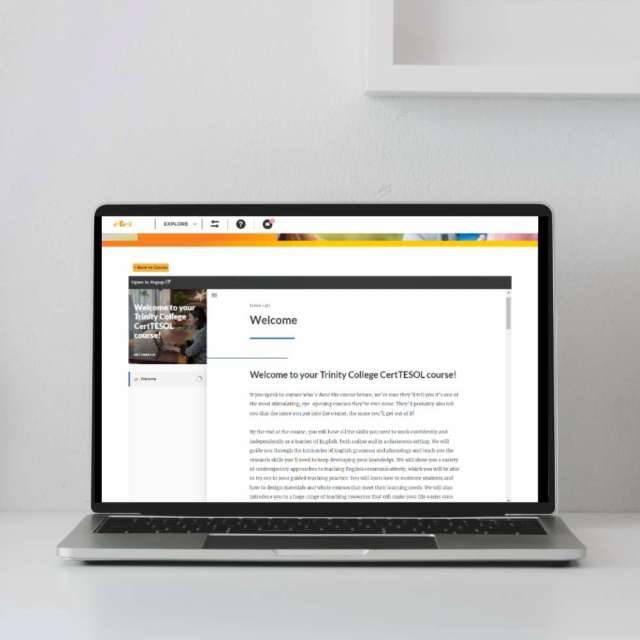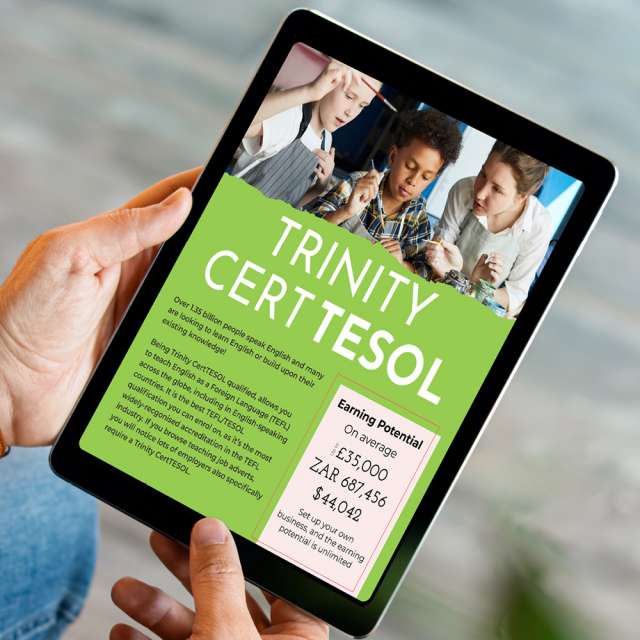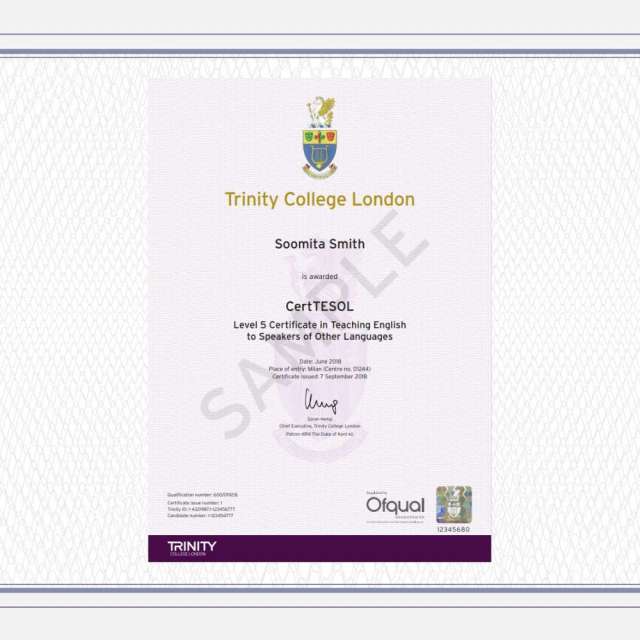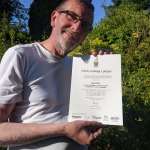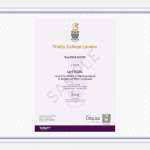Are there any requirements to undertake Trinity CertTESOL?
To enrol on the course, you must:
- Be 18+ years old
- Possess a qualification that is a high enough level to enter higher education in your home country (such as Level 3 or A Levels in the UK). The Level 3 120 hour TEFL course included in this product will meet this requirement.
- Have English proficiency of CEFR C1 (or similar)
- Pass an application and interview
Can I teach English if I speak with a regional accent?
The answer is ‘yes’! As long as your students can understand you, you’ll be fine. Students really benefit from hearing a variety of accents; after all, this is what they’ll have to get used to in real life outside the classroom. Just be aware that teaching materials such as coursebooks and dictionaries usually take ‘RP’ (the type of English traditionally used by the BBC) as their model, so you’ll need to know how this differs from the way you speak (we’ll help you with this in the phonology part of the CertTESOL course).
Who is this course suitable for?
Anyone who wants to Teach English as a Foreign Language (TEFL)/Teach English to Speakers of Other Languages (TESOL) in non-English-speaking countries AND English-speaking countries, and anyone who wants to make it into a long-term career. This includes:
- Gap year students
- Aspiring teachers
- Career changers
- Current teachers
- University graduates
- Those who want to live or work abroad
- Those who want to work from home
How is Teaching Practice organised?
The teaching practice is part of the course, and we will organise finding you students to teach. You’ll have live sessions with these students to practise your skills, and you’ll receive feedback from a supportive and skilled tutor, so you can keep improving!
When can I access my course?
You will have timetabled lessons. You’ll also be able to access course materials via our online portal, 24 hours a day, 7 days a week from your laptop or PC.
How do I access my course?
All of the lectures will be delivered over Zoom, therefore you will need a good internet connection and a working microphone/camera to participate in the lectures, workshops and teaching practice sessions.
How many other people are on the course?
You’ll be part of a cohort of up to 14 other teachers on the course. As all your lectures are timetabled, you’ll get to know your cohort really well and be able to share ideas, help each other learn, and build your network of TEFL/TESOL teacher contacts while you study. Having a support network of other teachers is super important when you’re starting out, as you’ll be able to encourage each other through everything, from job applications to first-day nerves! When you’re working as teachers, you’ll also be able to share any lessons plans you create or great resources you find, which will significantly cut down your prep time for classes!
How do I get started after I’ve passed the application stage?
Don’t worry, it’s really easy! Once you enrol, you’ll be sent your login details via email, and then you can get started. Remember, our Customer and Academic support teams are on hand to help, if you need any assistance along the way.
You should complete your Level 3 120 hour TEFL course first and on completion of this we will be in touch with dates for your live CertTESOL classes.
Can I do a TESOL course if I am not a native English speaker?
Yes. About 50% of the trainees on our courses are non-native English speakers. They make a tremendous contribution to our courses in terms of their knowledge of English grammar and empathy with the problems that English learners face.
Can I teach English if I can’t speak any foreign languages?
Yes. Modern teaching methodology does not rely on translation. We will teach you the skills you need to communicate effectively with students from all kinds of backgrounds without speaking anything other than English.
Can I do a TESOL course if I don’t know anything about grammar?
Yes. We will teach you everything you need to know about English grammar.
Will an online TESOL course prepare me for teaching in a physical classroom?
Yes. Our online courses are all fully validated by Trinity College London and are equally valid for online and classroom-based teaching jobs. Throughout the course we make reference to both modes of delivery, so that by the time you complete the course you will be fully equipped to work in either setting.
What is the difference between CertTESOL and CELTA?
The courses are very similar. They lead to the same level of qualification and are both recognised internationally but CertTESOL gives us more flexibility to tailor course content to the needs of our students.
Is it easy to find work?
Yes, most CertTESOL graduates find work within weeks of completing their course. Once you are suitably qualified, you will find there is plenty of demand for your skills. You then have the choice of teaching online, working from home or as a digital nomad, or teaching face-to-face in the UK or overseas. If you want to work overseas, it’s worth focussing on the latest hotspots; East Asia and South America are good choices. If you decide to complete your TESOL training with us, we will help you find work through our network of international contacts that we have built up over the years.
What is a typical TESOL teacher like?
We’re all different! Some people start TESOL teaching to finance a gap year or straight after finishing their studies; many others do it as a mid-life career change. A lot of TESOL teachers have language backgrounds, but you’ll meet plenty of people who have very different starting points.
What is a typical TESOL teacher’s day like?
Busy! A typical day will include teaching different groups of students at different levels, some 1-1 lessons, lesson planning and marking. And if you work at a good school there will also be plenty of training workshops to attend.
Who are the students?
One of the great pleasures of TESOL teaching is that it gives you the chance to meet people from all parts of the world- even from places you might never have heard of. Especially if you are teaching in an English-speaking country or teaching online classes, you are likely to have a wide range of nationalities in the group. Ages range from pre-school children to pensioners, and you’ll meet people from all walks of life: university students, hospitality workers, scientists and business professionals are all well represented in the classroom.
Is TESOL a good career?
TESOL is a brilliant choice especially if you’re looking for a career that is never boring and that gives you the opportunity to work in different places, you can move into a specialist area that will make you even more marketable and give you great job satisfaction.
What is the difference between CertTESOL and CELTA?
The courses are very similar. They lead to the same level of qualification and are both recognised internationally. We prefer CertTESOL because we feel it gives us more flexibility to tailor our courses to the needs of our trainees.
Entry requirements
Both valid for teaching adults and young learners.
Both Level 5 on RQF, both internationally recognised
Both require a minimum of 120 study hours and 6 hours of teaching practice.
Accreditation:
CertTESOL- Trinity College London
CELTA- Cambridge English Language Assessment
We prefer CertTESOL because:
The assignments are more practical.
Reflective teaching is an ongoing part of the course.
There’s more focus on 1-1 teaching (one project involves testing and teaching a 1-1 student).
There’s a whole series of foreign language lessons to put you in the shoes of the students and to demonstrate a range of teaching techniques.

